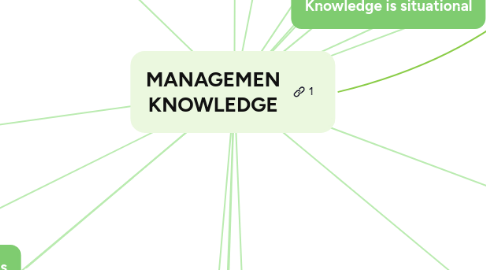MANAGEMEN KNOWLEDGE
by Mr Nicholas John Milton

1. Know-how, craft, skill
2. crowdsourcing
3. Organizational roles and responsibilities
3.1. Chief knowledge officer (CKO)
3.2. Communities of practice (COPs)
4. Knowledge management value chain:
4.1. Knowledge storage
4.2. Knowledge dissemination
4.3. Knowledge application
5. Three major types of knowledge management systems
5.1. Enterprise-wide knowledge management systems
5.2. Knowledge work systems
5.3. Intelligent techniques
6. Knowledge is a firm asset
6.1. Intangible
6.2. Creation of knowledge from data, information, requires organizational resources
6.3. As it is shared, experiences network effects
7. Organisational and personal learning
7.1. Action learning
7.2. business-driven action learning
7.3. e-learning
7.4. training
7.5. coaching
7.6. mentoring
7.7. Personal knowledge management
8. Knowledge has different forms
8.1. May be explicit (documented) or tacit (residing in minds)
8.2. How to follow procedure
8.3. Knowing why things happen (causality)
9. Both social and individual
10. Knowledge work systems
10.1. Knowledge workers
10.2. Requirements of knowledge work systems
10.3. Examples of knowledge work systems
11. Business intelligence
12. Intelligent techniques
12.1. Artificial intelligence (AI)
12.2. Expert systems
12.3. Artificial intelligence (AI)
12.4. Case-based reasoning (CBR)
12.5. Fuzzy logic systems
12.6. Neural networks
12.7. Genetic algorithms
12.8. Hybrid AI systems
12.9. Intelligent agents
13. decision support systems
14. brand management
15. wikis
16. Knowledge is situational
16.1. Conditional: Knowing when to apply procedure
16.2. Contextual: Knowing circumstances to use certain tool
17. Enterprise-wide knowledge management systems
17.1. Structured knowledge systems
17.2. Semistructured knowledge systems
17.3. Knowledge networks
17.4. Essential problem in managing structured knowledge
17.5. Structured knowledge systems
17.6. Semistructured knowledge
17.7. Semistructured knowledge systems
17.8. Organizing knowledge: Taxonomies and tagging
17.9. Knowledge network systems
17.10. Learning management systems
18. Decision-making focus
18.1. Complexity theory
19. Knowledge has a location
19.1. Cognitive event
19.2. “Sticky” (hard to move), situated (enmeshed in firm’s culture), contextual (works only in certain situations)


